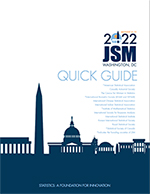Back
2022 Joint Statistical Meetings
Government Statistics Section
Session: Revisions
Inference Using Non-Probability Samples from a Demographic Survey
Thursday, August 11, 2022
Activity Number: 556
-
Giang B. Trinh
U.S. Census Bureau
Sample data sourced from surveys with high nonresponse rates or ‘big data’ present challenges for practitioners using these data for inference due to their non-probabilistic traits. To address these challenges, two model-based methods enabling inference from non-probability samples include quasi-randomization and super-population modeling. The purpose of this research is to simulate non-probability samples from a synthetic population and assess the quality of the inferences derived using the proposed model-based methods. Specifically, we will apply these methods to derive estimates for a target survey measure of unemployment in California. A new approach using a linear mixed-effects model of unemployment is introduced in an application of the super-population model-based method.

